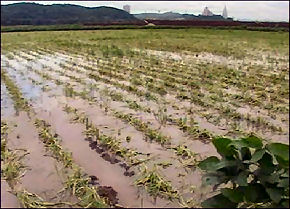26 October 2011
Flood-tolerant crop breakthrough
by Kate Melville
 Scientists from The University of Nottingham and the University of California, Riverside, have identified the molecular mechanism plants use to sense low oxygen levels, a discovery that could lead to the production of high-yielding, flood-tolerant crops.
Scientists from The University of Nottingham and the University of California, Riverside, have identified the molecular mechanism plants use to sense low oxygen levels, a discovery that could lead to the production of high-yielding, flood-tolerant crops.
With recent catastrophic flooding in Pakistan, Bangladesh, Vietnam, Australia, Thailand, the UK and America, engineering crop tolerance to partial or complete submergence has become a major goal for global food security.
"We have identified the mechanism through which reduced oxygen levels are sensed. The mechanism controls key regulatory proteins called transcription factors that can turn other genes on and off. It is the unusual structure of these proteins that destines them for destruction under normal oxygen levels, but when oxygen levels decline, they become stable. Their stability results in changes in gene expression and metabolism that enhance survival in the low oxygen conditions brought on by flooding. When the plants return to normal oxygen levels, the proteins are again degraded, providing a feedback control mechanism," explained Nottingham University crop scientist Michael Holdsworth.
Holdsworth got the first hint of the mechanism while investigating the regulation of gene expression during seed germination. The notion of connecting the mechanism of degradation of key regulatory proteins with changes in the expression of genes associated with low oxygen stress followed. He and co-researcher Julia Bailey-Serres, a geneticist at the University of California, Riverside, expect that over the next decade scientists will be able to manipulate the protein turnover mechanism in a wide range of crops prone to damage by flooding.
"At this time, we do not know for sure the level of conservation across plants of the turnover mechanism in response to flooding. We have quite a bit of assurance from our preliminary studies, however, that there is cross-species conservation. Our experiments on Arabidopsis show that manipulation of the pathway affects low oxygen stress tolerance. There is no reason why these results cannot be extrapolated to other plants and crops. What we plan to do next is to nail down this mechanism more clearly," said Bailey-Serres.
Related:
Discuss this article in our forum
Saltwater irrigation trial a success
GM Tomatoes May Pave Way For Other Drought Resistant Crops
Study Slams Mainstream Farming Techniques
Down On The Farm? Yields, Nutrients And Soil Quality
Source: University of Nottingham
